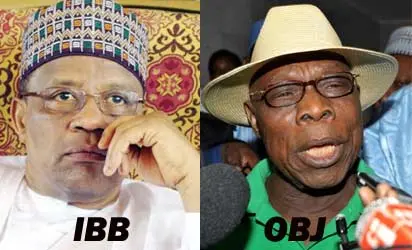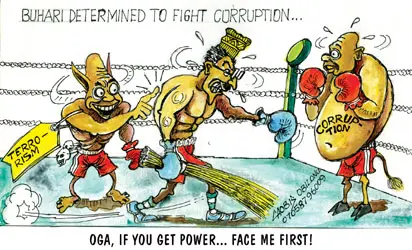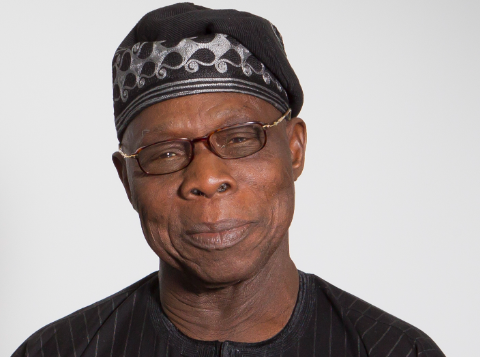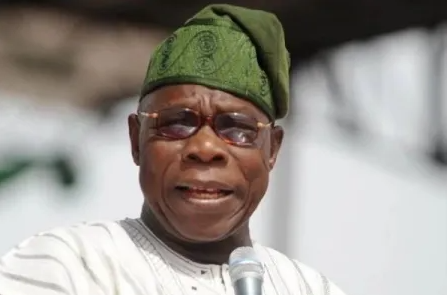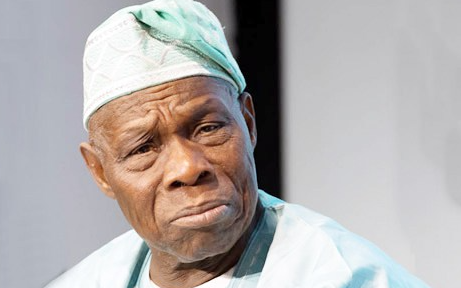The people of this country must not allow whatever sense of frustration, fear and despair we are experiencing now, to supercede our hopes for a collective destiny which lies in our continued existence as a nation. For us, and we believe for millions of other Nigerians, the continued unity of this nation is not only priceless but non-negotiable – Generals Obasanjo and Babangida
EARLY this week, two of the most important symbols of political leadership in the past three decades in Nigeria, Generals Olusegun Obasanjo and Ibrahim Babangida, added their voices of concern to worries about the state of affairs in the country. Against the background of growing insecurity in Nigeria, these ex-leaders issued a joint call for ‘peace, tolerance and dialogue’; they were ‘ready to do whatever is possible to promote the quest for peace and harmony’ and not only that, they would ‘join hands with all patriots to sustain and further enhance the unity and progress of this country’.
Well said! Two old warriors for national unity re-discovering their métier must be applauded for the over-flow of patriotic concern about the state of the nation and the courage to speak out. But in their patriotic declamations was there a lot more that was hidden?
Could a nation reeling from deepening insecurity trace its woes to the actions and inactions of these patriots? Just for a moment, can we assume that they were taking vicarious responsibility for the state of the nation? May we be allowed, in the effusive outpouring of concern about ‘whatever sense of frustration, fear and despair we are experiencing now’, to dig at the roots of these disturbing emotions?
Frankly, there can be no understanding the roots of the insecurity plaguing Nigeria today without a stroll on the shores of recent history. And the most discomfiting aspect of the experience is how these two gentlemen wove our lives into a tapestry of ‘frustration, fear and despair’.
Privileged by circumstance
They were privileged by circumstance and Nigeria’s generosity to be leaders at critical conjunctures in our history, but in the long run, they also presided over the elaborate depredation of our country. TheBabangida regime of the mid-1980s imposed a Structural Adjustment Programme, SAP, on Nigeria, which as we now know, were some of the most injurious economic policies ever imposed on African countries.
The decade of the 1980s became known as the ‘lost decade’ in Africa’s development, as essential social and economic spending eroded in our countries. In Nigeria, there was a systematic assault on the university system, health care facilities and essential infrastructural development simply fell off, just as the monumental corruption associated with military dictatorship reached a height.
But intrinsic to this decade of dislocation was the institution of violence and a bare-knuckled attitude to relationships in our society. The values of humanity, decency and honour gave way to a vacuous celebration of greed, vulgar acquisitiveness and a philistine celebration of corruption.
SAP saw the gradual withdrawal of the state from provision of a social net for Nigerians and consequently unleashed non-state, ethno-religious forces that have waxed stronger under Obasanjo’s neoliberal policies.
The criminals incubated within the endless transition politics of the Babangida period became the champion politicians of Obasanjo’s ‘democracy’: unprincipled; rootless; ruthless; and kleptocratic! The forces of violent Jihad too entered teenage and adulthood or were being born in the violent circumstances of SAP and reaching full maturity, able to build improvised explosives, in the years of Obasanjo’s “do-or-die” politics.
Nigeria had the opportunity to begin to achieve its tremendous potentials under Babangida and Obasanjo; but it is clear today, that these two individuals must take considerable responsibility for the sorry pass we arrived at as a country.
The most unacceptable aspect of the problem at hand is how each of them hopes to dominate the nation’s political process, largely for self-serving ends. When Babangida ended up crocked, with the annulment of the June 12, 1993 election, he manipulated the levers of power to bring back from prison and straight to office, General Olusegun Obasanjo.
Embittered dictator
A badly shaken and embittered dictator inherited power from near-bankruptcy. In an age of triumphal neo-liberal capitalism, Obasanjo unleashed greed and barefaced theft, hiding behind the policy of privatization. National assets were offloaded to cronies, who in turn contributed funds for massively rigged elections so emblematic ofObasanjo’s years of civil rule.
Since the state no longer provides jobs or was even obliged to provide social services under the virulent Nigerian strain of the neoliberal capitalist virus, funds accruing were simply stolen by state operatives and politicians. The hopes for democracy withered in the sun of systematic banditry and since 1999, Obasanjo became the Grand Commander of the process; and the process became addictive rather like dope for a drug addict!
Obasanjo even attempted to elongate stay in power, with a Third Term Agenda. It failed; and in a fit of vengeful fury, he imposed an invalid on our nation! What he could not possess, he devalued. This is the elaborate context which sired the “unfolding events over the last few years…threatening to unravel nearly a century old labour of Nigeria’s founding fathers…in building a strong, united, peaceful nation…” which they correctly identified but didn’t take responsibility for!
Each one momentarily hid, under over-starched Babbar Riga, the sharpened political dagger long poised to stab the other, to speak in unison about the plight of Nigeria. They spoke so well; but they must take the next step of leveling up with the Nigerian people by owning up for most of the ‘sense of frustration, fear and despair’ in the land. That will be the ultimate test of their patriotic concern!

